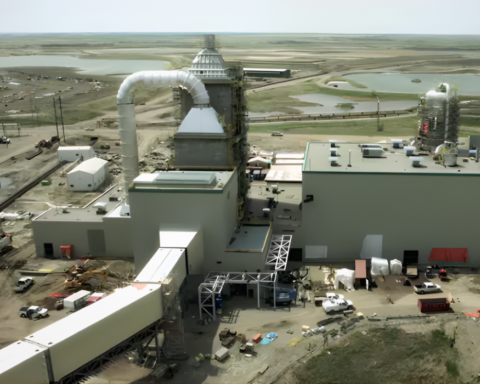This article is by Paul Klein, founder and president, Impakt, and Milinda Martin, vice president, community investment, corporate brand, and reputation, Time Warner Cable.
January 1, 2025, Irving, Texas: Exxon Mobil is proud to announce that its exit from the extraction and production of non-renewable resources is now complete. Back in 2015 the company began its 10-year journey out of fossil fuels by committing itself to a bold set of changes that have transformed the company and indeed the world. Key actions over the past decade include:
- hiring a new chief executive, formerly the president of the Environmental Defense Fund, an organization that believes economic prosperity and environmental stewardship go hand in hand;
- being certified as a B-Corporation, a designation stipulating a material positive impact on society and the environment;
- introducing a new class of shares whose value reflects both financial and environmental performance; and
transforming more than 10,000 Exxon and Mobil stations into local centers of sustainable transportation where customers can recharge their electric vehicles, buy or rent bicycles, and purchase discounted passes for local transit systems. - While this scenario sounds far-fetched, new research we conducted with Microsoft, Nestlé, Pfizer and Telus International reveals that announcements like this one may not be that unusual in 2025. “An intersection is coming where society will expect corporations to fill the void in the face of government cuts, and, likewise, corporations will expect their societal influence to increase as their social capital becomes the force of change in communities, countries and even entire global industries,” said Jeffrey Puritt, president of TELUS International.
We predict that 2015 will mark the beginning of a long-term transition of the role and purpose of the world’s largest public companies and the value chains they control. This shift will start with an acknowledgement that despite years of implementing initiatives designed to make the companies more “responsible,” real progress on climate change and other global issues has remained incremental. The new imperative for business leaders will be to embrace the idea that the viability of their businesses depends on solving the world’s most pressing societal issues.
“More or less all business started out with a social purpose of some kind, so the future may look more like a rediscovery of the social purpose of business,” said Paul Bakus, president of corporate affairs at Nestlé. “What’s been lost in recent decades is the long term perspective, values-based behaviours grounded in respect, and interconnectivity between the needs of society and the innovative dynamism of business.”
Today, corporations that connect the dots between social issues and business solutions are seen as leaders. But we are moving toward a time when leadership will mean having the courage to stake a much bigger claim. “Today our social investments focus on providing access to medicines and building health care capacity for those most in need,” said Caroline Roan, vice president for corporate responsibility at Pfizer and president of the Pfizer Foundation. “Ultimately, we are striving to create a commercial structure that will allow us to ensure that our medicines are used effectively and provided in an affordable and sustainable way to everyone who needs them.”
For millennials, who are often cited as the generation that will change the world, and who will make up the next wave of business leaders, this degree of commitment will be the rule rather than the exception. At Microsoft, this is taking shape with programs such as Tech for Good, focusing on providing software donations and cash grants to non-profit organizations, and YouthSpark, which aims to create opportunities for 300 million young people around the world in the areas of computer science education, employment, and entrepreneurship. “As this generation grows up and continues to shape the world, we will still see companies selling products—that certainly won’t go away—but we’ll see an even stronger desire for companies to be good corporate citizens with a ‘serving communities’ mission ingrained in their cultures,” said Lori Forte Harnick, general manager for citizenship and public affairs at Microsoft.
Further, a recent study by MSLGROUP, The Future of Business Citizenship, suggests that amid the emerging social purpose of business, millennials in positions of leadership will put the interests and priorities of their employees ahead of customers and shareholders. This re-ranking of stakeholders will be based on the belief that external value (higher profits and better products and services) is created by recognizing the interconnectivity of business and community and engaging employees to actively participate in improving both.
Externally, stakeholder activism continues to evolve and affect the way businesses work and intersect with social issues. “Now more than ever, stakeholder engagement is the cornerstone of corporate responsibility,” says Roan. Corporations are recognizing that they are more productive when all sides are able to understand one another’s interests, aspirations, and commitments, and work together. “In recent years, Nestlé has been engaging much more systematically with stakeholders, even constructively critical ones, to ask them what they expect of us,” said Bakus. “This has led to the development of 35 forward-looking commitments covering every area of our business—nutrition, water, rural development, sustainability, and compliance.”
When businesses commit to solving social issues, they need to think very differently about their competition. “People are moving away from asking ‘What’s in it for us?’ to asking ‘What’s the risk for our company to act alone?,’” said Doug Bannerman, North American head of social responsibility for Statoil. “We realize as an industry that we’re having cumulative impacts, so as an industry we have to have cumulative solutions.” In Alberta, oil and gas corporations have established the Oil Sands Community Alliance to effectively manage the issues associated with economic growth and to maximize benefits for the communities where they operate. “The scale of industrial impacts is so big that the expectation is now that we have to be partners instead of competitors,” Bannerman said .
Paradoxically, having a strong business commitment to social change will also means having an exit strategy from philanthropy. “I like to say that if we are successful, my team, Pfizer’s corporate responsibility group, will be out of business, and responsible business growth will be fully integrated into our commercial organization,” said Roan. Related to this, businesses that commit to solving social issues will support only those non-governmental organizations that are prepared to be redundant. Instead of providing philanthropic support to NGOs, corporations are already considering a range of other opportunities including helping charities transition from philanthropy to sustainable social enterprise, and delivering more socioeconomic value to communities by investing in local entrepreneurs. “I think companies realize that the biggest impacts that we make in the social sphere probably are not terribly sexy,” said Bannerman. “It’s what we pay in terms of taxes, what we pay in terms of royalties and fees, and what we pay suppliers that is most impactful.”
Companies such as Nestlé are already helping to redefine what scalable impact can look like when businesses focus on issues that are specific to their areas of expertise. Nestlé’s grains improvement program in Ghana and Nigeria is an inspiring example. The company has worked to reduce the high levels of mycotoxins (natural fungal contaminants that can cause immune suppression, impaired development in children, and liver damage in both humans and animals) in cereals, dried fruits, and nuts, which are important both to Nestlé’s breakfast cereals and to the health and livelihoods of local farmers. “With our partners—the International Institute of Tropical Agriculture and the College of Agriculture and Consumer Sciences at the University of Ghana—we worked with local farmers to improve agricultural and storage practices and raised awareness of the risks associated with contaminated grains,” said Bakus. “To those farmers who produced mycotoxin-free produce, we paid price premiums. The results? Farmers doubled their yields and their revenues, and we have increased sales of fortified Golden Morn by 56% since 2012, made from 100% good-quality local grains.”
Our research showed that social initiatives are not delivering enough impact because they are being pursued without real long -term vision of social purpose or bold commitment to social goals. “Companies need to become much more intentional about their corporate cultures, where social purpose will play a much larger role, even to the point where it’s a daily expression of who they are and why they exist as a business,” said Puritt.
To what degree is your company moving towards a vision as bold as the Exxon Mobil scenario? Bannerman says, “Rather than a company saying, ‘Well, we give a million dollars to Covenant House and Boys and Girls Clubs,’ which is what we’re used to saying, it should say, ‘We’re going to eliminate youth homelessness by 2025.’ That’s a much more bold goal, and I think that’s the kind of thing that we need to do inside all of our companies.”







